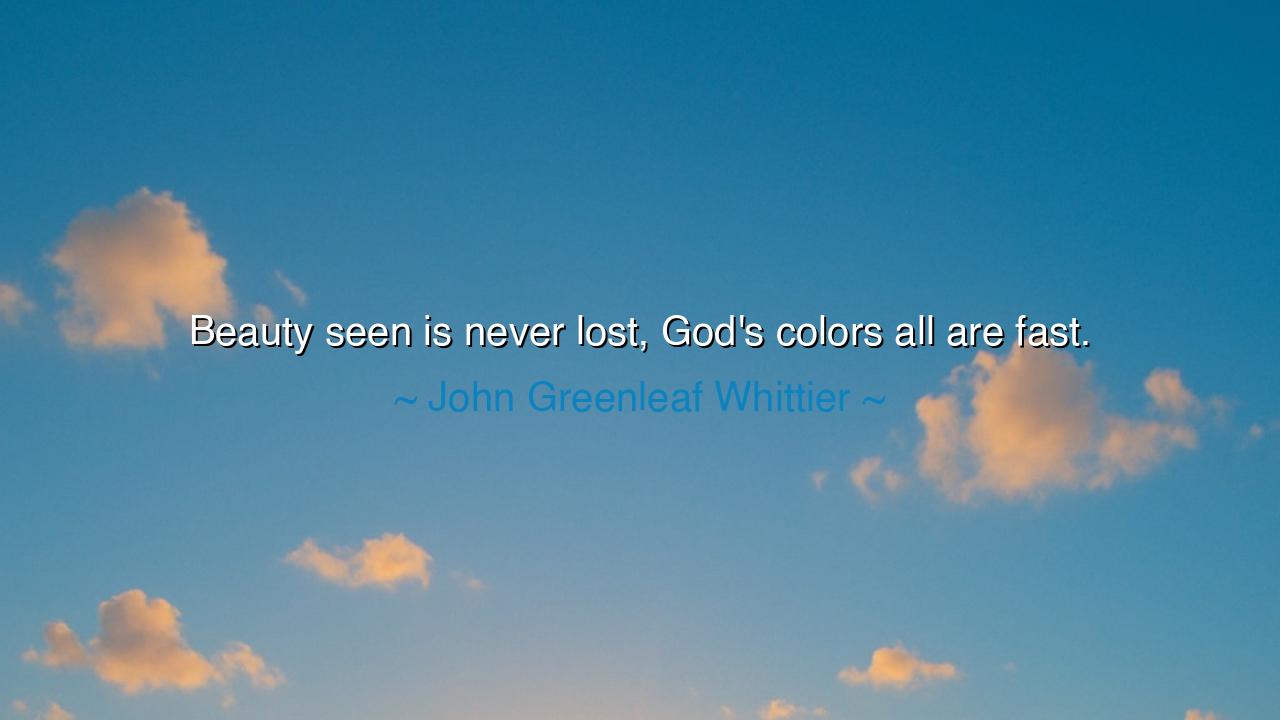
Beauty seen is never lost, God's colors all are fast.






Host:
The churchyard lay quiet under the last gold light of evening. Autumn had pulled its palette of endings across the trees — crimson, amber, rust. The wind moved softly through the grass, carrying the faint smell of pine and damp stone. Beyond the fence, a river whispered its old hymn to the setting sun.
At the edge of the cemetery, near a weathered bench, Jack sat with his coat collar turned up, a notebook balanced on his knee. His fingers were still — not writing, just resting. Jeeny stood nearby, one hand on the iron railing, her gaze on the horizon where light faded into bruise-blue shadow.
Jeeny: “John Greenleaf Whittier once said, ‘Beauty seen is never lost, God’s colors all are fast.’”
Jack: [quietly] “Fast. Meaning permanent. Unfading.”
Jeeny: “Yes. He meant that what we truly see — not glance at, not consume, but see — stays. That real beauty doesn’t vanish when the moment does.”
Host:
The river shimmered, catching the last threads of sunlight. Somewhere in the distance, a bell tolled, slow and deliberate — one note after another, like footsteps receding into memory.
Jack: “Strange thing, permanence. Everything feels like it slips away faster now — love, art, even grief. But maybe Whittier was right. Maybe beauty’s the one thing that lingers beneath the noise.”
Jeeny: “It lingers because it changes us. Once something makes you see differently, it can’t unmake that vision. The beauty leaves its fingerprint on the soul.”
Jack: “Like sunlight burned into film.”
Jeeny: [smiling faintly] “Exactly. God’s colors — they don’t fade. Even when the canvas does.”
Host:
The light dimmed slowly, turning everything silver at the edges — leaves, gravestones, her hair. The world was quiet enough now to hear the slow ticking of Jack’s watch.
Jack: “You know, when he wrote that, he was speaking from faith — that divine permanence. That beauty is eternal because it belongs to something beyond decay.”
Jeeny: “But even without faith, there’s truth in it. Think about it — the beauty we witness in life becomes part of our consciousness. Even after the body’s gone, it continues in memory, in stories, in art. That’s its immortality.”
Jack: “So when we remember, we’re re-painting what we once saw.”
Jeeny: “Yes. Every recollection is a resurrection.”
Host:
A flock of birds cut across the fading sky — small black silhouettes moving as one body, a kind of wordless punctuation to their thoughts.
Jack: “You think beauty and faith are the same thing?”
Jeeny: “Not the same. But siblings. Faith sees what isn’t visible; beauty makes what’s visible eternal.”
Jack: “So beauty is faith’s evidence.”
Jeeny: “And faith is beauty’s echo.”
Host:
The air grew colder, carrying the kind of silence that comes only when the world begins to exhale. Jeeny walked toward the bench, her steps soft on the grass, and sat beside him.
Jack: “You know, when I was younger, I thought beauty was fragile. That it faded like paint, that you had to hold onto it or lose it forever. But Whittier… he’s saying the opposite. That beauty’s the one thing that survives the ruin.”
Jeeny: “Because beauty isn’t the object. It’s the recognition.”
Jack: [turning to her] “Say that again.”
Jeeny: “Beauty isn’t the thing we see — it’s the moment we realize we’re seeing. That awareness is what never fades. God’s colors aren’t on the world; they’re in us.”
Jack: [softly] “Then no one ever really loses anything beautiful.”
Jeeny: “Exactly. The sunset ends, the face changes, the flower wilts — but the seeing remains. That’s the miracle Whittier was trying to name.”
Host:
The wind shifted, brushing a few leaves from the trees. They fell slowly, spiraling, gold and weightless — brief but not gone.
Jack: “You think that’s why we photograph everything now? Trying to trap permanence in pixels?”
Jeeny: “Probably. But photos can’t preserve the seeing. Only the memory can. Cameras don’t remember how it felt to breathe in the light.”
Jack: “So beauty’s not about proof. It’s about presence.”
Jeeny: “Yes. And presence is the one thing technology can’t duplicate.”
Host:
They sat in silence for a while. The sky deepened into violet. The first stars began to appear — faint at first, then certain.
Jack: “You know, I used to think eternity was a cruel concept. Too long. Too still. But maybe eternity isn’t endless time. Maybe it’s just the moments that never leave.”
Jeeny: [nodding] “The glances, the sunsets, the kindness that echoes long after it’s given. That’s what lasts. The colors that stay even when the picture fades.”
Jack: “So Whittier was painting with hope — that beauty’s not temporary, just transferred.”
Jeeny: “Transferred — yes. From sight to soul.”
Host:
The river caught the moonlight now, its surface glinting like a trail of molten silver. The reflection trembled but never broke — like memory itself, shimmering between form and feeling.
Jeeny: “I think he wrote that line for the grieving. For people afraid of losing what they love.”
Jack: “And what do you think he was trying to tell them?”
Jeeny: “That nothing truly loved ever disappears. It just changes medium.”
Jack: [softly] “The medium is the memory.”
Jeeny: “Exactly.”
Host:
The camera would pull back — the two figures small against the vast, fading sky. The sound of the river swelled, carrying their silence into something eternal. The stars multiplied, each one a reminder of light long past, still arriving.
And as the frame dimmed, John Greenleaf Whittier’s words would rise — no longer poetry, but prayer:
Beauty seen is never lost.
It travels from vision to heart,
from world to spirit.
The colors of God do not fade —
they move through time
like light through glass,
changing form,
never truth.
For whatever we truly see
becomes part of what we are.






AAdministratorAdministrator
Welcome, honored guests. Please leave a comment, we will respond soon